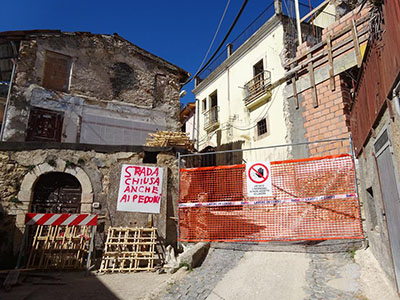Disaster management principles widely ignored after the L'Aquila earthquake 2009

The major earthquake in L’Aquila, Abruzzo, happened on 6 April 2009, leaving 309 people dead. Using the disaster risk reduction (DRR) paradigm and the United Nations principles for post-disaster interventions, University of Groningen researcher Angelo Jonas Imperiale analysed the actions of the Italian civil protection agency in the aftermath of the L’Aquila earthquake. He focused on the use of a command-and-control approach, emergency powers and top-down planning. Imperiale: “We studied the immediate response, the militarization of the area, the establishment of red zones, the provision of emergency shelter and temporary housing and the utilization of disaster myths. We concluded that the Italian disaster agency resoundingly failed to observe UN principles through its use of disaster myths as a belief system and its use of a command-and-control approach and top-down planning.”
The tragedy and multidimensionality of disaster impacts should induce disaster agencies to carefully analyse and manage the social dimensions of disasters in their planning of interventions. They should also consider disasters as opportunities to improve not only housing and infrastructure but also the structure of the local communities. Imperiale: “We found, however, that decision-makers often adopt a command-and-control approach and rely on emergency powers. Such institutional arrangements show that disaster agencies implement top-down planning without transparency and accountability and without considering the human rights and living environment of the affected communities and the ecological impact of their measures.”
The 14 principles
The research also showed that the local, regional and national Italian authorities failed to observe the 14 United Nations disaster management principles and that the European Union does not adequately assess or monitor EU-funded interventions by member countries, especially where achieving desirable social development goals is concerned. The interventions implemented by the Italian government using money from the European Solidarity Fund after L’Aquila are good examples. Instead of being used for humanitarian purposes, the Italian government used the EU funds to build temporary accommodation at 158% of the normal market cost and this became a permanent liability to the local population, which now suffers its ecological, health and social consequences.
“There is no systematic assessment of the ecological and social impacts of post-disaster interventions at the level of local communities. There is no systematic approach to disaster risk reduction, community empowerment and resilience-building. Post-disaster interventions are influenced by myths and misconceptions and do not acknowledge the social dimensions of disasters. They increase dependency on external support, annihilate the potential of local communities, cause more ecological and social damage and violate human rights while increasing the population’s vulnerabilities and risks. All this facilitates disaster capitalism and corruption, which will ultimately result in a second disaster”, says Angelo J. Imperiale.
No justification
“There is no justification for disaster management conducted on the basis of a command-and-control approach that is not accountable and transparent or that does not reflect the needs and priorities of local communities. Nor is it justifiable to neglect a careful consideration of the social and environmental impact and human rights concerns associated with post-disaster interventions. Alternatives to command-and-control must be developed to empower the local communities involved, to enhance their wellbeing and resilience and to respect international DRR principles”, he concludes.
About the disaster
The earthquake was felt throughout central Italy; 309 people are known to have died, making this the deadliest earthquake to hit Italy since the 1980 Irpinia earthquake. In a subsequent inquiry into the handling of the disaster, seven members of the Italian National Commission for the Forecast and Prevention of Major Risks were accused of giving ‘inaccurate, incomplete and contradictory’ information about the danger of the tremors preceding the main quake. In October 2012, six scientists and one ex-government official were convicted of multiple counts of manslaughter for downplaying the likelihood of a major earthquake six days before it took place. They were each sentenced to six years’ imprisonment. This verdict was overturned on 10 November 2014, however. The poor building standards leading to the failure of many modern buildings in a known earthquake zone were also criticized.

Temporary housing
After 10 years and 22 billion euros, ten thousand people are still living in temporary accommodation in L’Aquila, and red zones (restricted areas) are everywhere. The temporary housing scheme became a permanent liability to the local people who suffer its ecological, health and social consequences.
Recommendations
The researcher underlines that in order to prevent a second disaster in the aftermath of the original one, post-disaster interventions and their impact on local communities and their environment must be carefully evaluated, and that alternatives to disaster myths, command-and-control, emergency powers and top-down planning must be developed. Imperiale: “The conclusion I reached is that a switch from civil protection to community empowerment systems is required to reduce disaster risks, to enhance the wellbeing and resilience of the affected communities and to meet the UN principles for disaster management.”
More news
-
01 December 2025
The power of movement
